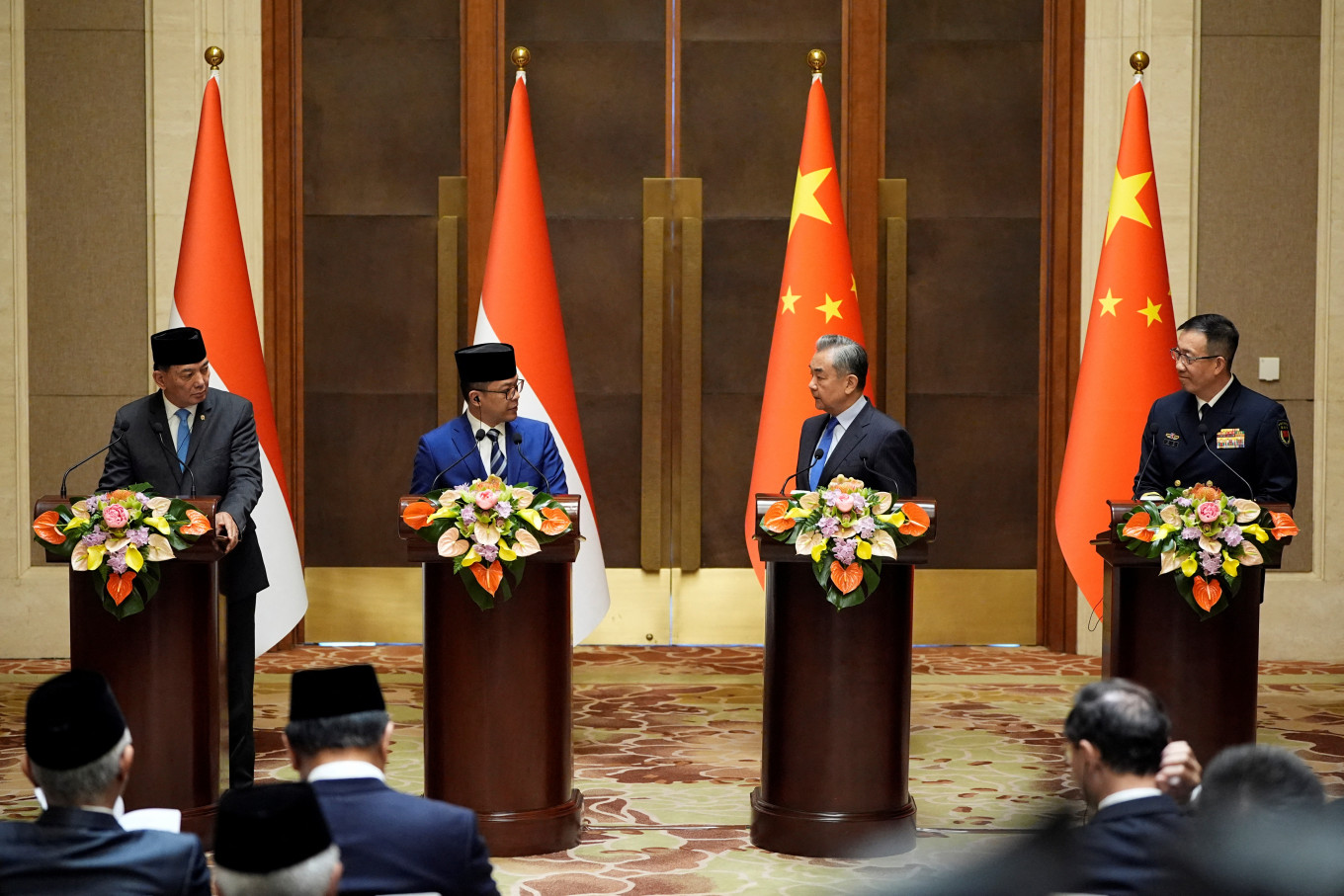Popular Reads
Top Results
Can't find what you're looking for?
View all search resultsPopular Reads
Top Results
Can't find what you're looking for?
View all search resultsComprehensive, strategic ties with China
Indonesia could nudge China to stop dragging its feet in concluding negotiations for a Code of Conduct in the South China Sea, something that ASEAN has been pushing for from Beijing for over two decades.
Change text size
Gift Premium Articles
to Anyone
 Defense Minister Sjafrie Sjamsoeddin (left) and Foreign Minister Sugiono and their Chinese counterparts Foreign Minister Wang Yi and Defense Minister Dong Jun attend a press briefing after the first meeting of China-Indonesia joint foreign and defense ministerial dialogue at the Diaoyutai State Guest House on April 21, 2025 in Beijing, China. (Reuters/ /Pool/Iori Sagisawa)
Defense Minister Sjafrie Sjamsoeddin (left) and Foreign Minister Sugiono and their Chinese counterparts Foreign Minister Wang Yi and Defense Minister Dong Jun attend a press briefing after the first meeting of China-Indonesia joint foreign and defense ministerial dialogue at the Diaoyutai State Guest House on April 21, 2025 in Beijing, China. (Reuters/ /Pool/Iori Sagisawa)
N
on-aligned Indonesia has navigated through the complexity of the big power rivalry by forging closer economic ties with China while building more intensive relations on security and defense with the United States. But the geopolitical landscape is constantly changing, necessitating that Indonesia always adapt to maintain and protect its national interests.
The inaugural “2+2 meeting” involving the foreign and defense ministers of Indonesia and China in Beijing last week could not have been better timed. The two countries signed the comprehensive strategic partnership in 2013, but without a strong security component, this relationship has not been all that comprehensive nor China all that strategic.
Significantly, this is China’s first 2+2 meeting with an Asian country, while Indonesia has already established this forum with countries like Australia, Japan and the US.
Over the years, China has become Indonesia’s main trading and economic partner, an inevitable development given China’s rapid economic rise in the last two decades to become the largest economy in the world. But we also detect a more assertive, if not hegemonic, trait in Beijing’s foreign policy conduct that raises concerns in some quarters.
This is all the more reason why the two countries should address the wider issues outside the economy, including security and defense, for this relationship to be mutually beneficial and sustainable. When the largest and third-largest Asian countries engage in confidence-building measures, the entire region benefits from the peace and stability that they ensure.
A regular meeting of their foreign and defense ministers allows both countries to have frank discussions about the challenges facing them. There are the global issues such as the current trade and tariff wars, and the conflicts in Myanmar, Ukraine and Gaza that necessitate their collaboration, but there are also the bilateral issues that need addressing.
One pressing security issue that the ministers need to discuss is the escalating tension over territorial disputes in the South China Sea pitting China against several Southeast Asian countries but also dragging the US and other big powers into the region.
Indonesia may insist that is has no territorial dispute with China in the Natuna Sea and dismiss Beijing’s claim of traditional fishing waters in the area as having no legal basis under international laws. But the reality is there are frequent skirmishes between Chinese fishing boats, accompanied by China Coast Guard vessels, and Indonesian Navy ships patrolling the area.
The two countries have to stop sweeping this problem under the carpet. In a closed-door setting, the ministers can try to reconcile this gap and may even pick up on the idea of joint economic cooperation in managing the area in dispute, as proposed in the joint statement by President Prabowo Subianto and President Xi Jinping last November.
Indonesia should also use this forum to nudge China to stop dragging its feet in concluding negotiations for a Code of Conduct in the South China Sea, something that Jakarta, through ASEAN, has been pushing for from Beijing for over two decades. When signed, all countries are committed to resolving their territorial disputes peacefully without the use of force.
The ministers should also explore ways of enhancing security cooperation as part of the confidence-building measures to eliminate any suspicions Indonesia may have about Beijing’s intentions in the region, including its so-called “nine-dash-line” maritime claim covering the entire South China Sea. Some of these suspicions are also based on the well-documented history of the Chinese Communist Party’s intervention in Indonesian politics in the 1960s.
Today, Indonesia has far more cooperation in the security sector with the US and the annual large Garuda Shield joint military drill is expanding all the time, though China is excluded. Indonesia also still sources most of the weapons it needs from the US.
It may take some more years before Indonesia feels equally comfortable in forging closer security and military ties with China, but the 2+2 meeting is a good beginning to put it on the right path. The intensifying big power rivalry between China and the US requires Indonesia to be even more resolute, not less, in upholding its non-alignment principles.










